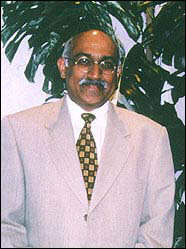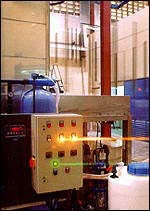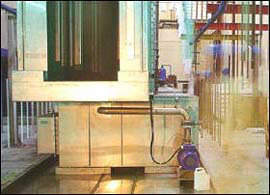
|
 | 
Interview with
Mr. Naresh Mehta,
Managing Director
Nairobi, May 4th 1999
Contact
Postal Address: P.O.Box 49197, Nairobi, Kenya.
Visiting Address: Mombasa Rd., Nairobi.
Tel : +254 (2) 823600
Fax : +254 (2) 823843
E-mail : ptlnrb@powertechnics.com
|
Power Technics is one of the few high-tech enterprises in Kenya. Please, tell us of how you started.
Power Technics was established in June 1982. We started with a capital of US$ 500 with only two people in the company.
We started the company manufacturing small motor control panels for local demand in the country, for companies supplying pumps, refrigeration cold rooms, etc. The initial purpose was to have a good living, making only a few panels in a day. Nevertheless, it so happened that the supply and demand situation in the country kept on changing as people started appreciating good quality panels which were coming from overseas. As people saw, good products were already available in the market, which is why demand grew. Consultants and architects approached us and the business kept on growing. We kept on striving towards a situation where we wanted to be at par with our technology with that of Europe or any other country. Meaning not reinventing a cartwheel again, but going to the right technology from day one. Obviously there were difficulties encountered in buying these technologies in those days, it was an import licensed regime. However, we did go through the whole process and managed to develop the country in a systematic way and continued to grow.
We now have now grown into a factory of 160 people for the last few years. On an average we increase about 10 people every four or five months. Even today, inspite of the current situation, at the moment we have slowed down, I think we aim to grow at that level. At the moment we have 14 qualified engineers and 100% staff is Kenyan. We have no expatriates in the company. There is a vast pool of educated manpower here. Of course, the education has to be in line with the technological needs. I think this is being addressed by the government at the moment by forums whereby Power Technics are now contributing to what kind of manpower we need, what kind of education we think should be part for the students curriculum. I think with these exchanges between the industries and the polytechnics and the learning institutes, we can foresee a better level of manpower than what we have seen in the past. As I said earlier, to create a demand for manpower is to create the quality manpower, quality staff and a correct level which is going to be the most trained manpower in the region. We can actually look into sending our engineers in the Region which would do a good job for the region. Kenya, being a prime motor of the Eastern African Community, there is a lot our engineers can do in the region, given the right environment.

It would be of great benefit to Kenya if all the policies were right. The finished products are sometimes at the same rate as the raw materials. We have already talked to the ministry about this issue. If they can bring down the imports on raw materials to lower levels and finished products to a higher level in line with World Trade Organization norms, then there is definitely an impetus on local industries to grow further. We should not become a super market for the world where we bring everything and sell everything. I think we should become if not an industrialized country, a semi industrialized country with core focus on agro-based industries.
What are the main commodities produced by Power Technics? Are they only targeted to the national markets, or does a part of them get diverted to international markets?
The company started from a small control centers and ventured to electrical power distribution switchboards and other different kinds of allied products. We represent some French companies like Schneider Electric. In line with market demands we continued to grow our product range to be made locally. There was a demand for lighting fixtures, since there was no quality manufacturing of lighting fittings in the country. Therefore we ventured into the lighting fitting business in 1990. Within the last 7 or 8 years we have become market leaders controlling more than 60% of the lighting business in the region. Thorn lighting is one of the market leader in Europe and the World for good quality lighting fixtures.
Then there was demand for Uninterrupted Power Supply (UPS) when the computer information technology grew in the system. So we ventured into UPS business under our associated company `Computer Technics', which also started with 2 people and has grown to about 25 people and again we are the market leader in the field. Anything we touch we want to be number one or number two or we don't want to get into it. All these businesses have grown to a good level and they are growing. We will need a very strong foundation based on ethical business practices. That is what is helping us to grow. We have created an image in the market and the image is actually bringing the returns on business.
What has been the major obstacle you had to overcome to become what you are today?
Though Kenya is basically an Agricultural or horticultural country, you still need cold rooms, you need light fitting, you need light to grow flowers at night. So basically electrical industry is an extended arm of agricultural progress in the country as well, because there is a huge demand. If you cannot fulfill these demands, you cannot even grow agriculture products. So the panels that we make, the motor controls the distribution boards, the switchboards are widely used on such areas. We do a lot of cold rooms, we do light fittings, lot of panels and pumping stations, because if you want to do horticulture and agriculture you need pumping stations for your water, so obviously for pumping stations you need electricity. Although the country is agricultural, we are the grinding wheels of agriculture. We are greasing the agricultural economy by electrics.
Do you get technology from abroad or do you develop your own technology?
The technology is ours. We only buy the machines from overseas. Now, though, we are getting into technology because the future growth of our companies in the region, is in strategic alliances. We cannot waste too much time trying to do things that have already been done in the world.
In line with what the market is demanding and with the region and markets growing, we have struck deals with Thorn lighting. This is an alliance whereby we manufacture some of their product range and the brand name in the region for export into the region and also some make arrangements whereby Thorn lighting would buy some fittings from us and sell it to other market in the Middle East or elsewhere. We have done the same with Schneider Electric, where we have technical agreements as well as a new license agreement to manufacture a brand new range of electrical switchboards to IEC standards. We are the first private company in the world with whom Schneider Electric has signed an agreement whereby we will able to manufacture the new range of switchboards which will be know as "Blockset" and which will be launched in six months time. The only other countries that are doing this particular range of products are Indonesia and Brazil. We are the first private company they have given a license agreement to manufacture under the brand "Schneider". | We go to international fairs like in Milan, Hanover. Our principles have grown in this region with us. So obviously they look at the future with us. It is uneconomical for them to set up a similar setup and invest so much in machines when we are already doing the same product. So if we grow, they grow with us automatically.
The Kenya Bureau of Standards has given you the diamond mark quality. Could you comment on this and why it has been awarded to you?
Some time back Kenya Bureau of Standards (KBS) came out with the diamond mark of quality, which was to be awarded to companies who applied and who qualified in terms of quality manufacturing of products to international standards. There are several companies, I believe about 30 companies, who have been given the diamond mark. There are present in every sector. We were the first company in the electrical sector to get this diamond mark, which we can put on our products produced locally. This is also used to promote Kenyan products in the region. Moreover, people buying products in the neighbouring countries can identify a quality product coming from Kenya as a diamond mark, which is a guarantee of good quality.
How about ISO- 9000? Have you started working on that?
We are working on the ISO-9000. It is not yet formalized, but we are working from the base with our people, with total quality management training. We are trying to do an ISO with less amount of paper and more computerization, whereby the handling of paper is reduced. So we have started from the base where we are doing some training courses. We are not pushing very hard, just for the sake of the certificate, we want to real ISO that people get the sense of belonging to be a quality company.
Do you also train your personnel when they come to your company?

We have an in-house training room here, where we do product training and technology training. To our staff we also conduct 6-7 courses in a year which is free for industries. We invite engineers from our principals in France, to train our staff. It is free to us, so our customers get almost free training. Each session has 20-25 participants. Every time they come, we take a different batch and its done on different kinds of products ranges each time. It is a regular training which we do every year.
How do manage to keep the Environment as untouched as possible?
A classic example of how we do as much for the environment as possible is to know that the most important part of manufacturing processes is painting. We have installed powder painting equipment and a pre-treatment plant. The equipment is from an American company, Nordson and another company in Germany Otto Müller. The effluent that is coming out after cleaning the metal is going into a separate room whereby we measure the Ph levels and we separate the oil and the impurities after cleaning and this passes through a filter press. The water residue which comes out goes through several stages of filtration and chemical process before we discharge the water into the system. We have a record of the water which we put back into the system and PH level control. It is not a necessity for such a plant today, but I am sure the environment standards that are being implemented all over the World will also be implemented in Kenya.
Are your products known in the USA, are you planning to explore there?
Basically, we are manufacturing the switchboards and panels here, importing basic materials like circuit breakers. These are imported and incorporated into the panels that we make for the region. We are doing all the engineering and steelworks and panels for the region. Our growth is tied up to our principals for supplying some part of technology and some part of materials as well. Since our territory responsibility is Africa, our concentration is based on Africa. Groups like Schneider Electric are looking at us to take care of the regional markets. We are the only company who has got manufacturing base in the region, apart from Schneider Electric who has got a factory in Egypt only. We are the only ones in East and Central Africa. Even in South Africa they do not have manufacturing facilities. We are manufacturing for Schneider Electric in the region and export to grow in the region.
What are your future plans for expansion?
We are looking at a couple of new products to manufacture locally after the year 2002 when our present machines are amortized. We are concentrating on our core sector of business which is electrics. Our associate companies, Phillips Pharmaceuticals and Radbone Clark are also expanding rapidly. The represent renowned companies like Bristol Myers Squibb, Merck Sharp & Dhome, Scherring, Nova and Abbot Laboratories. Radbone Clark represents Gillette in Kenya.
How do you combine pharmaceuticals with high technology?
One of my brother has been in pharmaceuticals for the last 20 years. We are No.1 on ethical pharmaceutical products, where we have specialized. We are not in generic products.
What is your final message for our readers?
The future in the next millennium is Africa. I definitely believe in it. I think 30 or 35 years in a life of a country is nothing, and if given the right will and the support, I am sure Kenya has the potential to grow as it is a rich country. |
|
© World INvestment NEws, 1999.
This is the electronic edition of the special country report on Kenya published in Forbes Global Magazine.
November 29th 1999 Issue.
Developed by AgenciaE.Tv |
|
| | | | |
| |
|

